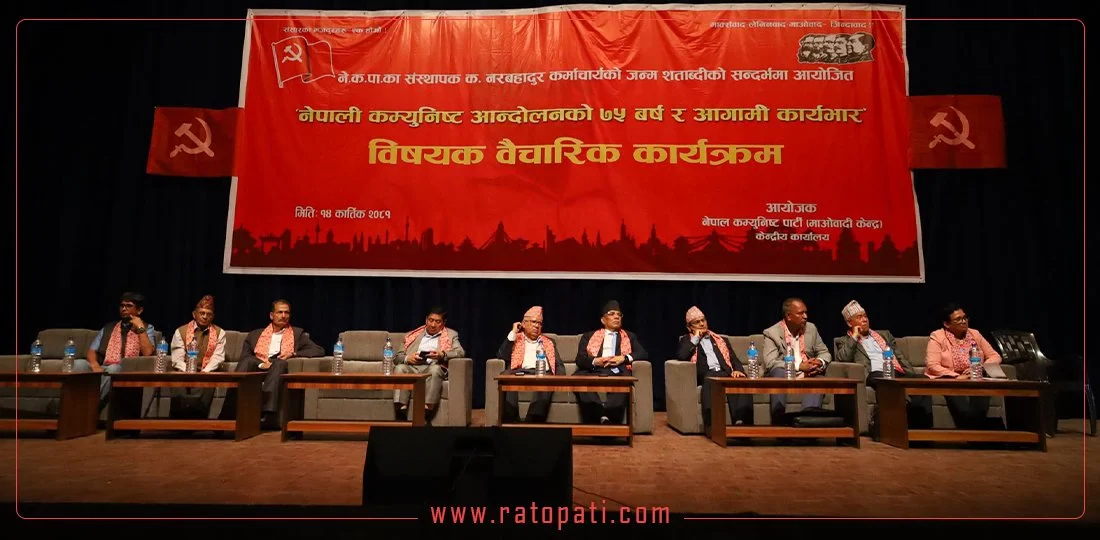Leaders call for serious review of communist movement in Nepal

Kathmandu, October 30 — Senior Communist leaders have emphasized the need for a serious review of the shortcomings and weaknesses observed during the 75 years since the establishment of the Communist Party of Nepal (CPN).
The discussion took place during an ideological program titled "75 Years of the Communist Party of Nepal and Future Tasks," organized by the Communist Party of Nepal (Maoist Centre) in Kamaladi on Wednesday, in conjunction with the centenary celebration of founding member Nar Bahadur Karmacharya.
Addressing the event, former Prime Minister and chairman of the Maoist Centre, Pushpa Kamal Dahal 'Prachanda,' urged party members to conduct a thorough review of their own parties' shortcomings with ideological clarity.
"It is essential to carry out a serious review within the Communist Party with ideological clarity. We cannot just talk about ideals while remaining in one place. A dialectical materialist approach must be taken for this review," Prachanda stated. "I appeal to all—let's evaluate the good and bad actions we have taken since joining the Communist movement."
He further stated that each Communist party should conduct a sincere review in order to identify their weaknesses and that he would take the initiative to prepare for the upcoming socialist revolution since he has already proposed unity, people's war, and peace.
"Merely recalling past heroic deeds of the Communist movement will not lead us to socialism. Strong determination with ideological clarity is required for that. I am ready to play a leading role in establishing that foundation," Prachanda asserted.
Similarly, former Prime Minister and chairman of the Unified Socialist Party, Madhav Kumar Nepal, highlighted that the growing corruption within the Communist Party is its most significant problem.
"Individualism is becoming dominant within the Communist Party. Selfish tendencies are increasing, and corruption is on the rise. This is the main issue facing the Communist movement," he remarked, adding that solutions to problems cannot be found until the Communist Party is free of corruption. Nepal expressed concern over the declining public trust in the party and its leaders, stressing that unity is essential for addressing the issues facing the country and the people.
He noted that the prevalence of fundamentalist and rightist thinking within the Communist Party has complicated matters further.
During the program, CPN-UML Vice Chairman Yuvaraj Gyawali stated that immediate unity between UML and the Maoist Centre is not possible. However, he suggested that parties with whom unity is feasible should come together.
"Currently, unity between the Maoists and UML is not possible. But that doesn’t mean it can’t happen in the future. Those parties with whom unity is possible should come together. UML is preparing to secure a single majority, and Prachanda is also preparing for the same," he said.
Gyawali emphasized that those who claim they will change the world must first change themselves, warning that those who cannot change themselves are merely deceiving the public. He asserted that a commitment to the ideas is necessary to establish a socialist system.
He pointed out that while a democratic revolution has been fundamentally completed, there needs to be clarity on whether to implement socialist programs now or merely prepare the groundwork.
Spokesperson for the Revolutionary Communist Party, Hemant Prakash Oli alias Sudarshan, expressed dissatisfaction over Prachanda returning to previous positions after leading the historic people's war, thanking him for his leadership. He stressed that merely seeking unity among leftist groups is insufficient; serious self-reflection is needed.
"Prachanda led the historic people's war, for which he deserves much gratitude. However, he has returned to where he started. We need to seriously review this," Oli said. "Let’s conduct an impartial investigation. Write a book without deception. What influenced you? Where did we go wrong? Unity cannot be achieved simply by discussing it. It cannot be achieved through electoral politics alone."
Oli accused the Maoists of being fearful of transitioning to scientific socialism, stating that following bourgeois capitalism will not lead to socialism and that without serious reflection, party unity cannot occur.
He analyzed the four ideological strands within the Communist movement over the past 75 years. He identified Dr. Keshar Jung Rayamajhi as the leader of the first strand, which he concluded has nearly disappeared due to the leadership of the CPN Unified.
Oli noted that the second strand, led by Pushpalal Shrestha, has weakened recently despite being maintained by the Nepal Majdur Kisan Party and Rishi Kattel.
He stated that the third strand emerged from the Jhapa uprising, forming UML and the Unified Socialist Party.
The fourth strand is identified as the CPN (Maoist), which he noted is led by the Maoists. He also mentioned the CPN (Mashal) as another faction.
During the program, Ram Prakash Puri, spokesperson for the CPN (Mashal), remarked that while the Communist movement in Nepal is divided into various factions, it will remain alive as long as classes exist. He accused top leaders of failing to unite the Communist Party and urged Prachanda and Madhav Nepal to take special initiatives for this.
"The Communist movement in Nepal has gone through significant ups and downs and is currently divided into various factions. Nar Bahadur Karmacharya himself expressed considerable dissatisfaction in his biography. There have been deviations in the Communist movement, with some abandoning principles," Puri stated. "The ultimate goal of Communists is to abolish the monarchy and establish a republic. Prachanda and Madhav Nepal must play a crucial role in uniting the Communist movement."
All leaders participating in the program depicted Karmacharya, the founding member of the CPN, as a leader with ideals, simplicity, integrity, and strong self-confidence, emphasizing the need to follow his ideals and work towards uniting all Communist parties.





Leave Comment